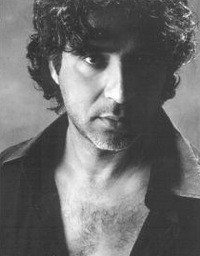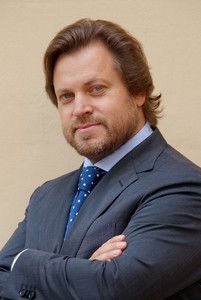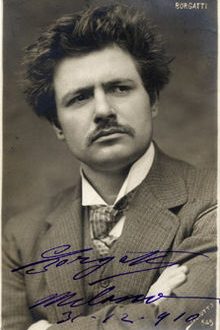
Andrea Concetti (Andrea Concetti) |
Andrea Concetti

STARS OF THE OPERA: ANDREA CONCETTI
This is the rare case when an author who decides to dedicate a separate article to an artist simply cannot resist starting not with the usual “tenor (baritone, soprano)… was born in…”, but with personal impressions. 2006, Arena Sferisterio in Macerata. After persistently circulating rumors that the traditional summer opera season in this small city in Central Italy is coming to an end (the reason, as always, is the same: “the money is eaten”), the good news is that the business will continue, the season is transforming into a festival with a theme, led by famous designer and director Pier Luigi Pizzi will rise. And now the audience fills the unique space of the Sferisterio, so that on a very cold evening by the standards of the Italian summer, they can be present at the performance of Mozart’s “Magic Flute” (some escaped and … lost a lot). Among the excellent performers, the performer of the role of Papageno stands out: he is good-looking, and throws out his knees like a circus celebrity, and sings in the most impeccable way, including German pronunciation and fidelity of accents! It turns out that in beautiful, but provincial Italy, there are still such Proteus … His name is Andrea Conchetti.
And here is a new meeting with the prettiest and most competent artist: again Macerata, this time the old theater of Lauro Rossi. Concetti is Leporello, and his master is Ildebrando D’Arcangelo in a brilliantly simple performance made literally “out of nothing” – beds and mirrors – by the same Pizzi. Those who attended the few performances can count themselves lucky. Two attractive, smart, refined, literally dissolved in each other artist showed an amazing couple, forcing the audience to simply die of pleasure, and striking the female part of her with sex appeal.
Andrea Concetti was born in 1965 in Grottammara, a small seaside town in the province of Ascoli Piceno. The Marche region, which is in no way inferior in beauty to the much more famous and widely advertised Tuscany, is called the “land of theaters”. Each, the smallest place, can boast of an architectural masterpiece and theatrical traditions. Marche was the birthplace of Gaspare Spontini and Gioachino Rossini, the lesser known Giuseppe Persiani and Lauro Rossi. This land will generously give birth to musicians. Andrea Concetti is one of them.
Andrea’s parents had nothing to do with music. As a boy, he loved to sing, starting in the local choir. The meeting with music came before the meeting with opera: he keeps the memory of Montserrat Caballe as Norma on the stage of the Sferisterio, a unique open-air opera venue in nearby Macerata. Then there was the conservatory in Pesaro, Rossini’s hometown. Refresher courses with illustrious baritone-buffo Sesto Bruscantini, soprano Mietta Siegele. Winning the A. Belli” in Spoleto. Debut in 1992. So Concetti has been on stage for eighteen years. But his real birth as an artist took place in 2000, when Claudio Abbado, after the singer literally “flew” into the play “Falstaff”, urgently replacing Ruggero Raimondi and not even being familiar with the conductor, highly appreciated the vocal and stage abilities of the young bass. After that, Concetti sang with Abbado in “Simon Boccanegra”, “The Magic Flute” and “That’s what everyone does”. The role of Don Alfonso brought him great success and became a landmark for him. Under the direction of Abbado, he sang in these operas in Ferrara, Salzburg, Paris, Berlin, Lisbon, Edinburgh.
Andrea Concetti’s voice is a warm, deep, flexible and moving bass. In Italy, they love the epithet “seducente”, seductive: it is fully applicable to Concetti’s voice. So fate itself commanded him to be the most excellent Figaro, Leporello, Don Giovanni, Don Alfonso, Papageno. Now in these roles, Concetti is one of the first. But least of all, the singer is inclined to “fixate” on the same characters. Slowly he makes forays into the basso profondo repertoire, sang the part of Collin in La bohème, and his Moses in Rossini’s opera recently won a huge success in Chicago. He argues that the opera “does not live only in La Boheme” and performs with enthusiasm in works that are not included in the short list of “large repertoire”.
It seems to the author of these lines that Andrea Concetti does not yet have the fame he deserves. Maybe one of the reasons is that basses and baritones never achieve the popularity that tenors easily do. Another reason is in the character of the artist: he is a person for whom moral values are not an empty phrase, a real intellectual, a philosopher who is well acquainted with world literature, an artist who is prone to deep reflections on the nature of his characters. He is sincerely concerned about the dramatic situation in which culture and education are in modern Italy. In an interview, he rightfully says that “the duty of the state is to shape the consciousness, civilized souls, the soul of the people, and all this – through the use of such tools as education and culture.” So the roar of enthusiastic crowds is unlikely to accompany him, although at the performances of Don Giovanni in Macerata and Ancona last year, the reaction of the public was very close to this. By the way, Concetti demonstrates a sincere attachment to his native places and highly appreciates the level of opera production of the Marche region. He was applauded by audiences in Chicago and Tokyo, Hamburg and Zurich, Paris and Berlin, but he is easily heard in Pesaro, Macerata and Ancona.
Andrea himself, with a great deal of self-criticism, considers himself “boring and melancholy”, and declares that he has no penchant for the comic. But on the theatrical stage, he is amazingly relaxed, including plastically, very self-confident, a true master of the stage. And very different. Comic roles form the basis of his repertoire: Leporello, Don Alfonso and Papageno in Mozart’s operas, Don Magnifico in Cinderella and Don Geronio in The Turk in Italy, Sulpice in Donizetti’s Daughters of the Regiment. In accordance with his penchant for melancholy, he tries to “paint” his comic characters with various colors, to make them more human. But the singer masters more and more new territories: he performed in Monteverdi’s Coronation of Poppea, Mozart’s Mercy of Titus, Rossini’s Torvaldo and Dorlisca and Sigismund, Donizetti’s Love Potion and Don Pasquale, Verdi’s Stiffelio , “Turandot” Puccini.
Andrea Concetti is forty-five years old. Blossoming age. With his desire to remain young as long as possible, even greater miracles can be expected from him.





